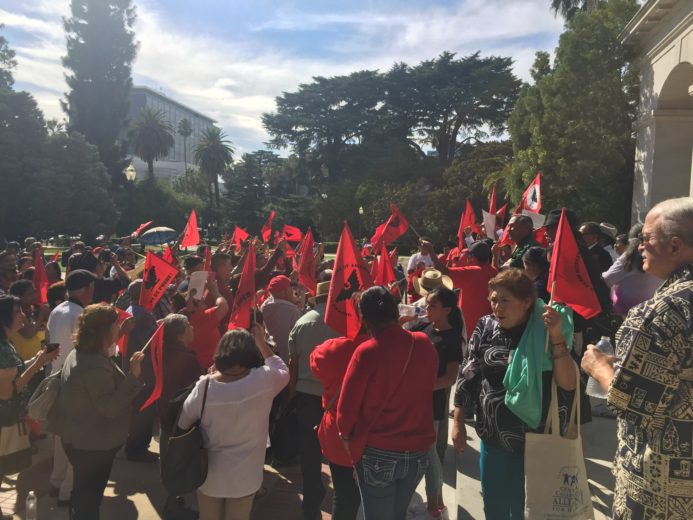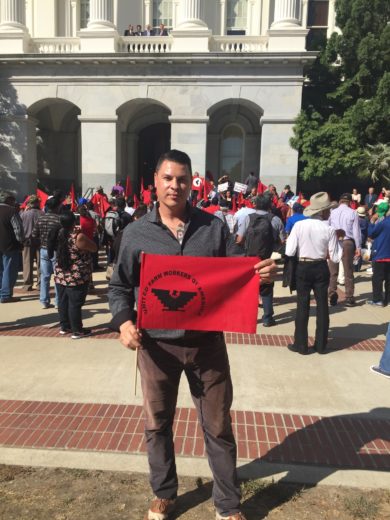
Opinion Piece Contributed by Moctezuma P. Sanchez
I was introduced to the work and story of Cesar Chavez as a young person. He is viewed and presented as a hero–if not a saint–by people in the community. Cesar Chavez did accomplish amazing things in his lifetime. During the height of the United Farm Worker union’s (UFW) influence he organized thousands of agricultural workers, shaped legislation, and brought the plight of poor, mostly Mexican-American field laborers into the national spotlight. It is why the Chicano Movement idolizes Chavez. The older I got and the more I learned about his work, the more I questioned this icon. His divisive tactics are often swept under the rug and forgotten. Chavez and his colleagues used derogatory Mexican stereotypes, public defamation and even violence against Mexican immigrants. To learn from his example you must acknowledge, examine, and be critical of these strategies as well.
Chavez Encounters Braceros
Chavez first worked as an organizer for the Community Service Organization (CSO). While there one of his actions was to pressure companies to stop using braceros–Mexicans who came through a US-Mexico federal work program during World War II– and instead hire unemployed Mexican-American citizens.
After resigning from the CSO, Chavez founded the National Farm Workers Association with his wife Helen and Dolores Huerta to organize farm workers into a union. They faced stark, and sometimes violent, opposition from agricultural growers and the Anglo dominated Teamsters union. Together with Filipino-American farm workers, they formed the UFW using strikes to overcome stalled labor negotiations. Chavez believed the biggest obstacle to successful strikes was the growers’ strategy of hiring undocumented workers and legal Mexican immigrants. These workers accepted poor working conditions and low wages that the UFW were fighting to improve.
Braceros first arrived in my hometown of Stockton, California in 1942. The program brought an influx of Mexican workers into the Central Valley and Southwestern United States. Soon unscrupulous opportunists like billionaire Alex Spanos realized they could undermine the programs legalities by directly importing undocumented workers from Mexico to work their fields. This is the situation Chavez and the UFW encountered.
Wet Lines and Race as a Scare Tactic
Strike breakers in the labor movement are called “scabs.” However, Chavez and Huerta went beyond that term. They racialized it, referring to Mexican immigrant workers as “wetbacks.” Their use of the slur happened in private as well as being openly employed in public discourse. In televised interviews like one on KQED in 1972, Chavez nonchalantly and regularly referred to workers from Mexico as “wetbacks.” This racial slur was originated by Anglo Americans in the 1940’s. It alludes to the stereotype that all Mexican immigrants swim the Rio Grande River to enter the United States.
Chavez marches to the state capitol in Sacramento are legendary. However, people forget or don’t know about the other marches. The UFW regularly set up “wet lines” at the US-Mexican border. They acted like modern day anti-immigration militias trying to keep Mexicans away from the U.S. “We had a ‘wet line;’ it cost us a lot of money, and we stopped a lot of illegals,” Chavez told the New York Times in 1979. On one occasion Chavez’s own cousin physically attacked immigrants at a demonstration. “They’d catch any ‘wet’ coming through and beat the hell out of them said the Sheriff of Yuma, Arizona in the same article. He also alleged that the UFW had ‘bombed the houses and burned the cars’ of potential strike‐breaking aliens and bribed Mexican officials not to interfere with the ‘wet line.’
When questioned about the violence Chavez said he was unaware of it and after speaking to those present, “I didn’t find anything that made me feel anything wrong had happened.” Not exactly the condemnation you would expect from someone who predicated their Causa on non-violence.
Chavez’s hard line on undocumented Mexican immigrants was a persistent issue throughout the 1970’s with other Chicano activists and groups according to his biographer Miriam Pawel. “He seized on immigrants as the latest explanation for why the union could not win a strike,” she wrote in her book The Crusasdes of Cesar Chavez. Chavez even went so far as to launch an “Illegals Campaign” and allowed the UFW to report individuals to the Immigration and Naturalization Service. He routinely criticized President Nixon for allowing “wets” into the country and testified in Congress that not enough was being done to keep undocumented immigrants out. “If there were no illegals being used to break our strikes, we could win those strikes overnight and then be in a position to improve the living and working conditions of all farm workers,” he wrote to the San Francisco Examiner in 1972.
A Herculean Task

I personally understand the urgent need to help workers. I am a former union organizer and business agent. The odds that Chavez and the UFW would win their strikes were slim. Lax laws benefited the politically and economically powerful agricultural industry. Few people cared about Mexicans (legal or not), Filipinos, or other poor workers doing the back-breaking work of feeding America. Growers definitely played dirty, even utilizing the Teamsters to stifle their efforts. Organizing and winning farm contracts and advancing their working conditions was a Herculean task at best. Chavez knew this. Everyone supporting their movement did too. But it is unacceptable to dehumanize and antagonize others. People were upset with these tactics then and still are today. The term dehumanized not only immigrant workers but also the same workforce and members the UFW represented.
This critique is not about revising history. It is about examining the truth and looking at the actual events of a leader’s success, and missteps, to learn from them. Propagating vitriol while using terminology like “la Causa” and Mexican religious symbolism is wrong. Chavez and Huerta knew better. They made a choice. They did not publicly dehumanize the greedy growers or corrupt Teamsters that colluded to keep workers oppressed. Instead they attacked the weakest link: other exploited Mexican. As a citizen of Mexican descent I could never support that in any generation.
This is also not a call to demonize Chavez. What he accomplished improved the lives of untold numbers and benefited generations. Chavez’s tactics, personality, and leadership activated many. He gave a voice to the invisible. Those same traits also alienated those closest to him such as Larry Itliong, the often-overlooked Filipino labor leader also from Stockton who initiated the Delano strike that the creation of the UFW. The UFW under Chavez’s leadership reached great heights but also dwindled in membership. Today it is just a shell of its former self.
It is still fighting, however. When legislation passed in 2016 to provide farm workers, regardless of union membership, overtime pay it was a historic moment. I was there as a Chicano activist and a business agent for the Teamsters. I helped UFW organizers lobby for this law. I understood the historical significance on more than one level.
Cesar Chavez deserves his place in history. As do the many who worked to accomplish the historical gains the UFW made. He is not here to explain his racialized tactics. However, Dolores Huerta is. She owes it to his legacy to acknowledge and learn from those errors for present and future generations.
I do, and always will, observe Cesar Chavez Day. I show gratitude for the often unseen and overlooked contributions of those who Chavez represented and fought for and what they provided myself and the world. The fight is not over.
